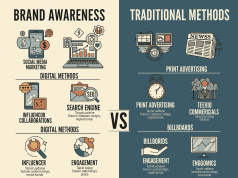In the rapidly evolving landscape of marketing technology, the integration of artificial intelligence (AI) stands out as a transformative force. With businesses striving for efficiency and effectiveness in their marketing strategies, AI presents an unparalleled opportunity to leverage data-driven insights and automation, fundamentally reshaping how brands connect with consumers.
The Rise of AI in Marketing
The marketing sector has always been data-intensive, but the sheer volume of data available today is staggering. According to recent estimates, over 2.5 quintillion bytes of data are generated daily. AI technologies—ranging from machine learning to natural language processing—are being deployed to sift through this immense data pool, providing actionable insights that drive decision-making.
Personalization at Scale
One of the most significant advantages of AI in marketing is its ability to deliver personalized experiences. Traditional marketing methods often rely on generic approaches, but AI enables marketers to tailor messages to individual preferences and behaviors. By analyzing consumer data, AI can predict what products or services a customer is likely to be interested in, allowing brands to craft personalized marketing messages that resonate on a deeper level.
Consider the example of e-commerce giants like Amazon, which use AI algorithms to suggest products based on past purchases and browsing behavior. This level of personalization not only boosts conversion rates but also fosters customer loyalty and satisfaction.
Predictive Analytics
Predictive analytics powered by AI is another game-changer. By analyzing historical data, AI algorithms can forecast future trends and consumer behaviors. This allows businesses to make proactive marketing decisions, optimizing their strategies based on anticipated market movements. For instance, brands can identify peak purchasing times, enabling them to launch targeted campaigns that align with consumer readiness to buy.
Enhanced Customer Engagement
AI chatbots and virtual assistants are revolutionizing customer service and engagement. These tools, powered by natural language processing, can provide immediate responses to customer inquiries, offer product recommendations, and guide users through their purchasing journey. With AI handling routine queries, human agents can focus on more complex issues, enhancing overall service quality.
Automation of Marketing Processes
The automation capability of AI extends to various marketing tasks, including email marketing, social media management, and content creation. Automated systems can schedule posts, track engagement metrics, and even generate content tailored to specific audience segments. This not only saves valuable time but also ensures a consistent and responsive marketing approach.
Challenges in AI Integration
While the potential benefits of AI in marketing are immense, integrating these technologies is not without challenges. Data privacy concerns are paramount; businesses must ensure they comply with regulations like GDPR, safeguarding consumer data while leveraging it for marketing purposes.
Additionally, there is the challenge of data quality. AI algorithms are only as good as the data inputted into them; poor-quality data can lead to misleading conclusions and ineffective marketing strategies. Companies must invest in robust data management practices to ensure accuracy.
Looking Ahead: The Future of AI in Marketing
The future of marketing will be deeply intertwined with AI technologies. As these tools continue to evolve, marketers will need to stay ahead of the curve by embracing innovation, adapting to new tools, and continually learning how to leverage AI effectively.
In the next phase of AI integration, we can expect increased collaboration between humans and machines, where AI enhances human creativity rather than replaces it. This symbiotic relationship will enable brands to develop richer and more engaging marketing campaigns.
Conclusion
Integrating AI into marketing technology represents a pivotal shift, offering businesses guidance through the complexities of modern consumer behavior. From personalized experiences to predictive analytics and automation, AI empowers marketers to enhance their strategies and engage more meaningfully with their audiences. As we move forward, embracing AI will be critical for brands aiming to thrive in an increasingly competitive landscape. The future is bright, and those willing to explore the next frontier in marketing technology will reap the benefits.









